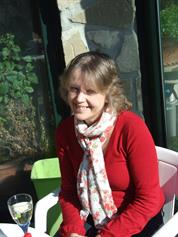Two FRSAs involved in two very different fields of work realised that they could do something quite powerful together - something which challenges the norms of our economy and puts people at the centre of design and production. In many ways this is Wales at the forefront of doing things differently
Cathy Treadaway is Professor of Creative Practice at Cardiff School of Art and Design, Cardiff Metropolitan University. For a number of years, she and her team have been involved in designing playful objects for people living with advanced dementia with the aim of improving their lives and their well-being.
Using ‘Compassionate Design,’ an approach that places loving kindness at the heart of the design process, a range of new playful products have been developed. Many of these are designed specifically for an individual; others are a general design which can be tailored for each individual – but it is this individual fit which is one of the things which makes the products very effective in changing things for the individuals who have them. One particular product, HUG®, has received international interest and demand. Cathy and her team are now taking this product through extended testing with a view to producing large numbers to sell across the health and care services and across the world.
Karen Davies is Chief Executive of a small Welsh charity called Purple Shoots. Karen set up Purple Shoots 5 years ago to tackle poverty, isolation and unemployment in Wales through encouraging self-reliance, entrepreneurship and independence.
This is done in two key ways:
- Microfinance – offering small loans to individuals on an ethical basis to enable them to start or run a small business. These loans are made to individuals who would be unable to access funds from any other sources – 96% of borrowers are on benefits at the time they receive their loan
- Self-reliant groups – aimed at people left behind by the economy either through illness, disability or life circumstances but who want to make changes in their lives and move forward. The groups provide an enabling environment so that members can build confidence, learn and share skills, test out income generating ideas, save and earn funds and move towards better financial circumstances. It is these groups which proved a good fit with Cathy’s work.
Cathy needed to produce 40 HUGs® for the testing to begin. 40 is too low a number to make it feasible or cost effective for a mainstream manufacturer to produce and she was contemplating making them all herself with the help of her small team. Karen had a relatively new self-reliant group which was building itself around sewing skills. Some were good at sewing and some were beginners. A number of them had personal challenges and difficulties – issues with anxiety and depression and some other health issues, which made it difficult for them to find work and meant that their confidence was at a low ebb. Karen suggested to Cathy that they could make her 40 – and Cathy agreed to try.
At a first meeting, the research team had some worries as to whether it could be done – but a venue was booked and work began. Over a period of 5 consecutive weeks, for one full day a week, Karen’s group and Cathy’s team worked together and completed the task. Cathy’s team nurtured and taught the sewing novices and taught the whole group a manufacturing process, utilizing the best of each group member – and at the end gave each one a certificate in textile production from the university. Each group member was paid a small amount for their work as well – but in an evaluation of the project done by Cathy’s team, the things which they valued most were their growth in confidence and self-esteem and being part of something bigger.
When the HUG® goes to full production, it may be that it isn’t practical for it to be made on a small-scale like this, but it might be – and the 5 ladies in the group are now the experts in how it is done and they could continue to make the bespoke items. The group could grow in numbers and take on more work like this.
This is a new way of doing manufacturing. Karen saw something like this in India – a central factory did only quality control and negotiation of orders and payments – all the work (in this case clothing manufacture) was done by a number of groups like the self-reliant groups in Wales, across Mumbai, fitting the work in around caring responsibilities and other things, working from home and earning a proper wage. We could replicate this in Wales, growing our group numbers and their skill sets and taking on work. This means products would be made locally and income earned from them would stay in the local economy, benefitting local people and other local businesses. Bespoke items link the individual producer with the person for whom they are made, building links and connections across communities – the women who made the HUGs® have visited the homes where they are now being used and evaluated by residents living with dementia.
Karen and Cathy would like support – both technical and financial – to develop this into a viable alternative way of design and production which meets individual needs in an ethical, sustainable way with a myriad of other benefits around building communities, connections and local economies.


Be the first to write a comment
Comments
Please login to post a comment or reply
Don't have an account? Click here to register.